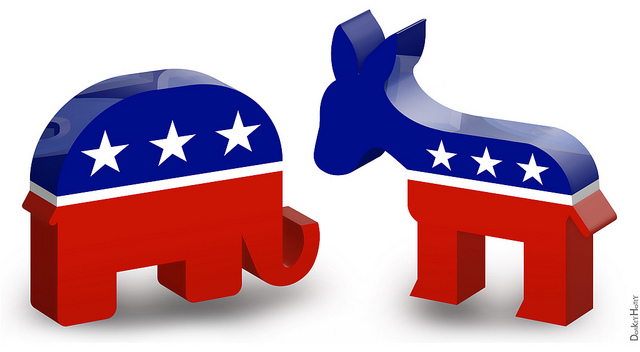The Republican Party is going insane.
The Quinnipiac University Poll released on Thursday shows that Trump leads 44 percent to Rubio’s 28 percent here in Florida, the establishment favorite’s home state. A highly predictive statistical model created by Stony Brook University projects that if Trump wins the nomination, which seems likely at this juncture, he will win the general election. To top it off, Chris Christie, a moderate candidate considered part of the Republican establishment, endorsed Donald Trump on Friday. A Republican candidate who dropped out early in the 2016 G.O.P race, South Carolina Senator Lindsey Graham, joked at Congress’s annual media dinner, “‘My party has gone batsh** crazy… How did I lose to these guys?’”
For a long time, there has been a strong belief in the “invisible primary.” The idea is that through funding particular candidates, the party establishments get to choose the primary field before voting even starts. To win actual votes, candidates need to win the approval of party elites and the interests they represent. This has been a universally accepted concept for decades. One of the most prolific 20th century political scientists, Nelson Polsby, asserted that the central purpose of a political party is to nominate candidates.
The Republican Party is broken because it cannot nominate the candidate that it wants – nor even an experienced, competent candidate. The Grand Old Party totally lost its reigns with this election and cannot fulfill its most basic function. Analysis of why that is incorporates many different factors, including the basis of Donald Trump’s personality alone.
The basic function of the party is to use money and endorsements to select candidates. The problem in this election is that money and endorsements do not have the same meaning for voters as they did in the past.
This new pattern presents a curious paradox: because voters are worried about the impact of big money in politics, they are choosing candidates who refuse to accept huge donations from large industries and interest groups. This conscious choice to not support moneyed candidates has weakened the power of corporate wealth to sway this election, so the impact of big money seems less significant.
Since the Nevada primary, Hillary Clinton has a clear shot to the nomination and is no longer significantly threatened by Bernie Sanders. This may seem to support the idea that money is still playing a big role in the political system. Yet according to Vox.com, Sanders has received more individual donations than any presidential candidate in history. Bernie’s unlikely rise to the top of the Democratic field, albeit brief, shows that not only can candidates still lead viable campaigns while rejecting large campaign donations, but that this can also be a positive campaign strategy.
Moreover, Clinton would not have had any real challenge given her track record, impressive career, establishment support and potential historic significance, if not for that one glaring flaw keeps being attacked: her ties to Wall Street and other moneyed interests. Voters have felt like they do not know where her true allegiances lie because of all the moneyed interests to which she may be playing.
Political data analysis site FiveThirtyEight has traditionally used a “polls plus endorsements” forecast in combination with a “polls-only forecast” to make predictions on the outcomes of individual primaries. The theory is that endorsements have traditionally been very indicative of electoral outcomes, so they hold a lot of stock.
This election, though, the polls-only forecasts have been more indicative of the outcomes. Sanders has outperformed expectations despite his utter lack of endorsements. Trump only has endorsements from two Congressional representatives and two governors, paling in comparison to Rubio’s 25 representatives, 13 senators and four governors.
It has consistently been the Democratic Party that has supported campaign finance reform. However, the Republican primary voters have also embraced this rebellion against big money. Part of Donald Trump’s appeal is that he is not beholden to anyone; he can fund his own campaign, so he can speak his own mind and pass his own policies. No matter how outlandish Trump is, no one can say he is not himself.
The role money has played in politics is not overestimated. It is a huge (or “yuuuuge”) problem. The 2016 election thus far has proven not that money no longer matters, but that voters can make a deliberate choice to rebel against big money and throw their support to candidates who are beholden to no one but the voters.
Annie Cappetta is a sophomore majoring in ecosystem science and policy and political science. Vantage Point runs alternate Mondays.
Featured image courtesy Flickr user DonkeHotey







